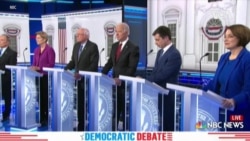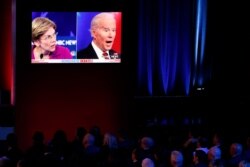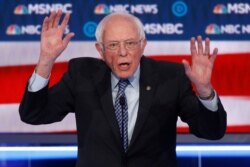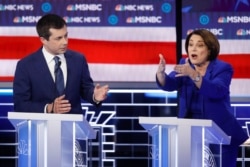For much of the past year, the Democratic presidential candidates focused most of their energy on one common target — President Donald Trump. But on Wednesday night in Las Vegas, Nevada, they eagerly found a new one — former New York City mayor Michael Bloomberg.
From the start, Bloomberg came under attack and it was clear he had walked into the political equivalent of the "lion's den."
Massachusetts Senator Elizabeth Warren led the barrage by comparing the former mayor to the man in the White House.
"I'd like to talk about who we're running against, a billionaire who calls women fat broads and horse-faced lesbians," Warren said on the debate stage. "And no, I'm not talking about Donald Trump, I'm talking about Mayor Bloomberg."
Warren added a cautionary note.
"Look, I'll support whoever the Democratic nominee is, but understand this, Democrats take a huge risk if we just substitute one arrogant billionaire for another."
The others on the debate stage also took shots, including current front-runner and Vermont Senator Bernie Sanders, former vice president Joe Biden, former South Bend, Indiana, mayor Pete Buttigieg and Minnesota Senator Amy Klobuchar.
Bloomberg remained stoic at times during the criticism and at other times seemed to roll his eyes. He did try gamely at one point to reassert the main rationale for his candidacy.
"I think we have two questions to face tonight. One is, who can beat Donald Trump? And No. 2, who can do the job if they get into the White House? And I would argue that I am the candidate that can do exactly both of those things."
Poll rise
Bloomberg has become a major target because he has moved up in the polls in the past several weeks, bypassing some of the Democratic contenders who have been on the campaign trail for a year. In some recent national surveys, Bloomberg is vying for second place behind Sanders with Biden and Warren.
According to the nonpartisan political website FiveThirtyEight.com, Sanders and Bloomberg have risen an average of three points in polls over the past week, while Biden has slipped in national surveys by an average of five points.
Mindful that Bloomberg has become a major challenger nationally, Sanders took plenty of shots at him during the debate, even as Sanders fended off barbs from his rivals.
"We are giving a voice to people who are saying we are sick and tired of billionaires like Mr. Bloomberg seeing huge expansions of their wealth, while a half-a-million people sleep out on the street tonight," Sanders said at one point during the debate.
Bloomberg's rise in the polls is due to his spending more than $300 million on television ads around the country, especially in the key states that will vote in the Super Tuesday contests on March 3.
Bloomberg's strategy is to exploit the uncertainty in the Democratic race, especially after a poor performance in the early voting states by Biden, who for all of 2019 was the Democratic front-runner.
"His (Bloomberg's) candidacy was really contingent on there being a muddled race. There is a muddled race," said Jim Kessler of the centrist Democratic-leaning group Third Way. "So if you look at the chess board right now, which he has no control over, the pieces on the chess board have moved in probably the most advantageous way for him."
But the pieces on the chessboard are different than what played out on the debate stage. All along, Bloomberg's main rationale is that he can be a centrist alternative to Sanders that will draw in not just Democrats in November, but independents and even some Republicans looking for a reason to avoid voting for Trump.
Centrist slot
Bloomberg is trying to muscle his way into the moderate or centrist lane of the Democratic Party. But it is a lane that is already crowded, said Associated Press Washington Bureau Chief Julie Pace.
"Joe Biden, Amy Klobuchar and Pete Buttigieg, who are really looking to break out of that moderate lane, he (Bloomberg) is actually making that lane much more crowded by getting in the race at this stage."
Bloomberg skipped the first four contests of the primary season and is looking to break out on Super Tuesday, when 14 states will hold Democratic primaries and Bloomberg will be forced to deal head on with his rivals.
"He has not really faced the scrutiny of the other candidates. I think he might have a place to put his flag on (compete for votes) but we do not know," said John Fortier of the Bipartisan Policy Center. "So I think the possibility is there because of his money, because of the spending he has done. And yet we do not know if he will stand up to the scrutiny of the other candidates."
Recent polls show Bloomberg could be competitive in some of the Super Tuesday states, including Virginia, North Carolina and Oklahoma.
Super Tuesday is the largest single delegate haul of the entire primary season with 1,345 pledged Democratic delegates at stake out of a total of 4,051 pledged delegates who will attend the Democratic National Convention in July in Milwaukee, Wisconsin. Also waiting in the wings at the convention will be 714 Democratic super delegates who would not get a vote on the first ballot of the convention unless the outcome was certain.
Should the convention move past a first ballot, however, the super delegates could play a decisive role in choosing a nominee.
Bloomberg will continue to bombard the airwaves with TV ads in the days leading up to Super Tuesday. But his rivals are sure to raise questions about his viability after a rocky performance in his first debate.
The next Democratic debate is Tuesday in South Carolina.









